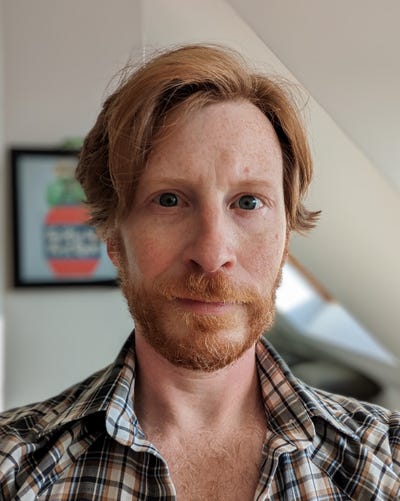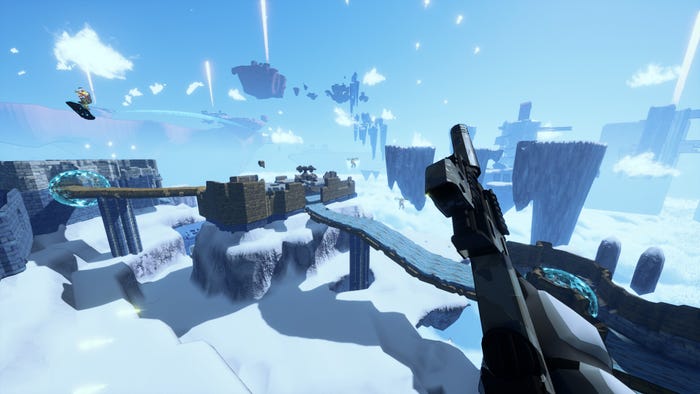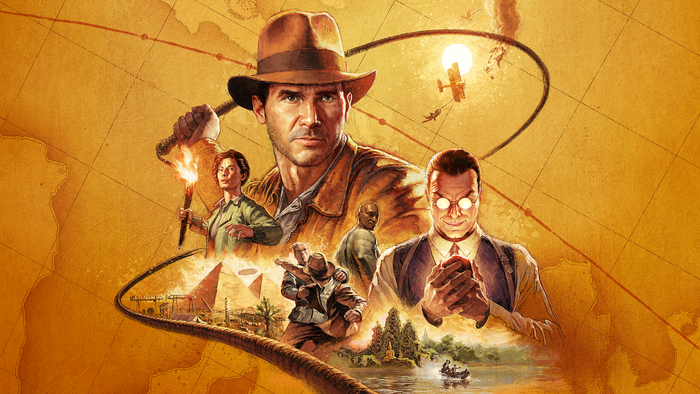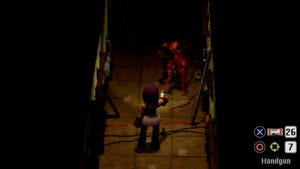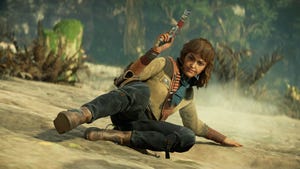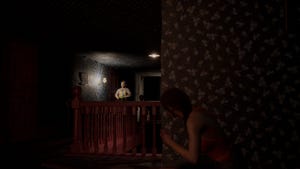.png?width=700&auto=webp&quality=80&disable=upscale)
A seven-year blink of an eye: Before Your Eyes' woes deconstructed at GDC
Childhood friends come together to make a dream video game. What could go wrong? According to its narrative lead, nearly everything.

Long before webcams dominated our lives as a remote work necessity, a college student wondered in 2014 if they might be good for something else: a unique control option for a video game. The genesis of Before Your Eyes, which eventually launched in 2021 and won IGF and BAFTA awards, was a readily available PC plugin that somehow differed from other emerging camera-and sensor-based concepts in games.
With the plugin, "even the most basic computer webcam could do eye tracking," Before Your Eyes creative director and writer Graham Parkes said at a GDC 2023 presentation, "and my friend [Will Hellwarth] wanted to design a game around that—specifically around the process of eye blinking."
Hellwarth had begun making such a game as a USC thesis project with other students, he told Parkes, but he wanted a hand with its narrative aspects. Parkes, a high school friend and frequent gaming buddy, was across the country attending NYU with an emphasis on playwriting. Could he chip in with writing and narrative design? Maybe their other childhood friends could help, too?
According to Parkes, this cheery, friendship-filled start, which he described as "the single greatest phone call I ever received," didn't lead to a simple development process. Instead, it spiraled into "five years of constant failure." Albeit, with a happy ending.
"People were leaving the booth crying"
Shortly before they began their project, Parkes and Hellwarth had become increasingly charmed by a wave of prestigious, experimental games, and Parkes cited the likes of Papers, Please, Gone Home, Thirty Flights of Loving, and The Stanley Parable. Parkes's studies at NYU and day job at the nearby Film Forum helped him view this wave of intriguing games through a unique lens: "In my very pretentious, NYU film-kid way, I became obsessed with this idea that these filmmakers, from the silent era or Alfred Hitchcock or the French new wave, if they were alive today, they'd probably be making video games and not films."
This led to Parkes signing up for a few of NYU Game Center's courses, though this diversion ended abruptly: "This is a GDC talk from somebody who couldn't make it through an Intro to Unity course," he told the crowd. "I hope that gives some hope to anybody here who may be as dumb as I am."
Parkes' inspiration board when he began crafting a plot for Before Your Eyes
Hellwarth's eventual phone call felt like a better fit: an opportunity to apply his playwriting chops to an industry he was much more passionate about, powered by a webcam-fueled concept that combined interactivity with existential dread. "What if we make a game about losing?" Parkes said. "No matter how hard you try, you can't win a staring contest with a webcam. You have to blink. What if you lose over and over again, and you die, and that's the end?"
Two more childhood friends joined soon after to assist with art and music, and the combined team completed a 15-minute playable prototype in time to submit to Indiecade in 2014. The game was accepted, demonstrated at an Indiecade event, and won the event's "Developers Choice" award. "It barely worked," Parkes said. "I mean, the blink tech really was rough at that time. But when it did work, we were shocked by people's reactions. And I'll be honest, the the game really wasn't good enough to elicit the reactions it was getting. People were leaving the booth crying."
An unwinnable staring contest with a robot
The same prototype won the following year's IGF award for Best Student Game, at which point Parkes admitted that "we started getting kind of cocky." This led the development team down a few different roads of ruin, and the first was easy for Parkes to call out. As the game's lead writer, he couldn't overcome a feeling of creative bankruptcy, evidenced in early game versions by shameless homages and even outright plagiarism from the likes of Death of a Salesman and the Twilight Zone.
Parkes eventually realized that his own narrative dead-ends, including a period where he experimented with the narrative design engine Twine, could be blamed in part by the design team's unwillingness to budge on a core design issue. "The story always felt like excuses for our tech demo," he said. "How the fuck are you supposed to tell a story when the player might blink out of any scene at any moment?" Again, the game originally bumped time forward in the story any time it recognized the player's eyes blinking. Anyone with allergies or hay fever might be doomed to skip past chunks of the story in a single coughing or sneezing fit.
To drive the point home, Parkes showed a picture of a prototype player staring with eyes bulging, as if trying to win an unwinnable staring contest with a robot. Eventually, the developers found ways to concede that sometimes, blinking can be okay, and they did this by "siloing" certain narrative sections so that they couldn't be blinked through so quickly. Still, testers made clear that what they enjoyed in a 15-minute festival burst didn't translate to enjoyable two-hour sessions. The developers began to fear that the results would drive a ton of Steam refunds within that storefront's two-hour window.
"We turned on each other"
Thus began a serious spiral with the developers, which consisted mostly of longtime friends. Arguments would begin with faceoffs about design decisions, particularly about blink-related mechanics, only to devolve into "arguments about who we are as people," Parkes said.
These conversations were made all the more severe by pressure from Kickstarter backers, whose campaign raised $35,000: "I still laugh when I look at that number, considering the scope of what we were trying to do," Parkes said. The community's originally positive comments and feedback turned toxic as the project's years dragged on, which Parkes described as "fair" due to his team's mistake of over-promising and under-delivering. What was less fair, Parkes said, was how his team internalized and made assumptions about those funders' words.
"We began to feel that there was this angry public outside with pitchforks, which only compounded our stress," Parkes said. "So we did what any team of immature man-children would do in that situation. We turned on each other. We started pointing fingers, and we started blaming each other for all our failures as a team."
Parkes then paused to take a breath at the GDC podium. "This is a talk about failures. This is really the only one that I'm actually ashamed of, because you really can't create anything without an emotionally safe environment, and you can't call yourself a team unless you trust each other. A couple years into our failed Kickstarter, we found we had neither of those things. That was really hard for us to admit to ourselves, because we were all such old friends and we loved each other so much, but maybe that was part of the problem: we loved each other too much, kind of like family. And there weren't, you know, the kind of clear boundaries that you want in a work situation."
Saved by the metronome
Parkes conceded that his team's way out of its dark hole wasn't a clever initiative or someone taking leadership, but sheer luck. Each team member was juggling day jobs over the course of Before Your Eyes' lengthy development, and this meant Parkes was connected to filmmaking opportunities, which included a chance meeting with a Verizon-owned experimental filmmaking group named Ryot (not to be confused with Riot Games). The company rep remembered Before Your Eyes as a compelling, award-winning indie. Ryot wanted to fund AR and VR experiences, and Before Your Eyes worked with eye-tracking systems inside select VR headsets.
"They chose to believe in in the game and the team at a point when truly no one on the team believed in it," Parkes admitted. That funding, followed by a deal with Skybound Games, increased the game's budget enough to hire new people (who brought new passion and interest into the beleaguered project), bring on more QA testing (which gave the team hard, emotionless data that the team's old friends could use to resolve otherwise tricky arguments), and add a new lead designer (who began infusing the game with fun applications of the game's core blink-to-shape-the-world mechanic).
All of those factors were combined with a new idea: to turn off the ability to blink game-time forward unless a metronome appeared on screen. Players now had a clear delineation for when they could freely blink, and crucial moments when the pressure and tension cranked up to emphasize the brutal truth of time's relentless march forward. Testers were happy. The development team was happy. The old friends were happy again.
"Put your hand on the stove and hold it there"
With more levity in the project, Parkes also discovered an opportunity to reset the entire script and come to terms with his own impostor syndrome. He finally admitted that he'd put pressure on himself to write a script that would be as original and groundbreaking as Hellwarth's compelling mechanical premise had seemed to him so many years ago. He got back to reflecting on his youth—and on shared childhood experiences with his coworkers. A new weekly regimen left Parkes able to work on the script in isolation, then return to his friends to talk about the writing and plot directions he'd come up with. They became excited that the new script let them render real-life locations from their childhood in the game.
Photos of the development team of Before Your Eyes when they knew each other as children
This process led Parkes to face an uncomfortable period in his childhood, which required hospitalization and 18 months of homeschooling. Drawing from that well of experience, Parkes ultimately found himself writing a script that resonated deeply with fans and critics alike. He admitted at GDC that he hated the "write what you know" cliche, especially as someone who felt he'd never lived an interesting life. So he reframed that advice to fit how he ultimately found success as a writer.
"You want to be able to be able to write from a place of personal vulnerability," Parkes said. "Approach subjects that make you uncomfortable, things that you may be want to run away from. You have to be willing to put your hand on the stove and hold it there. If you force yourself in that direction, you know, into those vulnerable, uncomfortable places, that's where, you know, a lot of the magic really starts to happen."
Read more about:
FeaturesAbout the Author
You May Also Like

